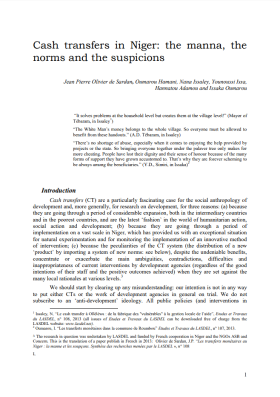Cash transfers in Niger: The manna, the norms and the suspicions
Cash transfers (CT) are a particularly fascinating case for the social anthropology of development and, more generally, for research on development, for three reasons: (a) because they are going through a period of considerable expansion, both in the intermediary countries and in the poorest countries, and are the latest „fashion‟ in the world of humanitarian action, social action and development; (b) because they are going through a period of implementation on a vast scale in Niger, which has provided us with an exceptional situation for natural experimentation and for monitoring the implementation of an innovative method of intervention; (c) because the peculiarities of the CT system (the distribution of a new “product” by importing a system of new norms), despite the undeniable benefits, concentrate or exacerbate the main ambiguities, contradictions, difficulties and inappropriateness of current interventions by development agencies (regardless of the good intentions of their staff and the positive outcomes achieved) when they are set against the many local rationales at various levels.
Many local fieldworkers and NGO personnel are no doubt already aware of most of the problems we identify, especially those surrounding targeting operations. Hence, for them, our reports are not exactly “scoops”, but they do offer two advantages: first, rather than remaining confined to doubts, rumours or impressions, they enable these different problems to be documented in a manner that is serious, substantiated and indisputable, via a comparative, multi-site approach. Second, the reports allow the problems to be brought out into the open and debated in public instead of being swept under the carpet or remaining mired in the newspeak of projects and administrations.
This report examines the following four points: the methodology and the problems encountered; a short history of cash transfers in Niger; the individual stages of the CT process and the problems arising at each stage; and, finally, the central paradox of CTs: the imposition of external and incoherent rules.



